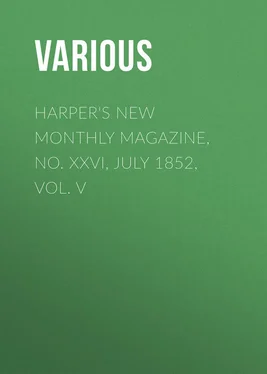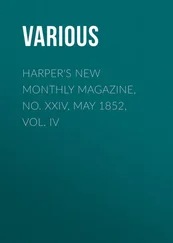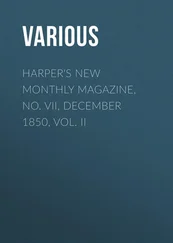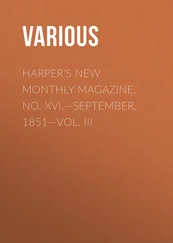Various - Harper's New Monthly Magazine, No. XXVI, July 1852, Vol. V
Здесь есть возможность читать онлайн «Various - Harper's New Monthly Magazine, No. XXVI, July 1852, Vol. V» — ознакомительный отрывок электронной книги совершенно бесплатно, а после прочтения отрывка купить полную версию. В некоторых случаях можно слушать аудио, скачать через торрент в формате fb2 и присутствует краткое содержание. Издательство: Иностранный паблик, Жанр: periodic, foreign_edu, на английском языке. Описание произведения, (предисловие) а так же отзывы посетителей доступны на портале библиотеки ЛибКат.
- Название:Harper's New Monthly Magazine, No. XXVI, July 1852, Vol. V
- Автор:
- Издательство:Иностранный паблик
- Жанр:
- Год:неизвестен
- ISBN:нет данных
- Рейтинг книги:4 / 5. Голосов: 1
-
Избранное:Добавить в избранное
- Отзывы:
-
Ваша оценка:
- 80
- 1
- 2
- 3
- 4
- 5
Harper's New Monthly Magazine, No. XXVI, July 1852, Vol. V: краткое содержание, описание и аннотация
Предлагаем к чтению аннотацию, описание, краткое содержание или предисловие (зависит от того, что написал сам автор книги «Harper's New Monthly Magazine, No. XXVI, July 1852, Vol. V»). Если вы не нашли необходимую информацию о книге — напишите в комментариях, мы постараемся отыскать её.
Harper's New Monthly Magazine, No. XXVI, July 1852, Vol. V — читать онлайн ознакомительный отрывок
Ниже представлен текст книги, разбитый по страницам. Система сохранения места последней прочитанной страницы, позволяет с удобством читать онлайн бесплатно книгу «Harper's New Monthly Magazine, No. XXVI, July 1852, Vol. V», без необходимости каждый раз заново искать на чём Вы остановились. Поставьте закладку, и сможете в любой момент перейти на страницу, на которой закончили чтение.
Интервал:
Закладка:
This mournful bird can fry a sole, however, which is much. Can cook a steak, too, which is more. I wonder where it gets its Sherry! If I were to send my pint of wine to some famous chemist to be analyzed, what would it turn out to be made of? It tastes of pepper, sugar, bitter almonds, vinegar, warm knives, any flat drink, and a little brandy. Would it unman a Spanish exile by reminding him of his native land at all? I think not. If there really be any townspeople out of the church-yards, and if a caravan of them ever do dine, with a bottle of wine per man, in this desert of the Dodo, it must make good for the doctor next day!
Where was the waiter born? How did he come here? Has he any hope of getting away from here? Does he ever receive a letter, or take a ride upon the railway, or see any thing but the Dodo? Perhaps he has seen the Berlin Wool. He appears to have a silent sorrow on him, and it may be that. He clears the table; draws the dingy curtains of the great bow-window, which so unwillingly consent to meet, that they must be pinned together; leaves me by the fire with my pint decanter, and a little thin funnel-shaped wine-glass, and a plate of pale biscuits – in themselves engendering desperation.
No book, no newspapers! I left the Arabian Nights in the railway carriage, and have nothing to read but Bradshaw, and "that way madness lies." Remembering what prisoners and shipwrecked mariners have done to exercise their minds in solitude, I repeat the multiplication table, the pence table, and the shilling table: which are all the tables I happen to know. What if I write something? The Dodo keeps no pens but steel pens; and those I always stick through the paper, and can turn to no other account.
What am I to do? Even if I could have the bandy-legged baby knocked up and brought here, I could offer him nothing but sherry, and that would be the death of him. He would never hold up his head again, if he touched it. I can't go to bed, because I have conceived a mortal hatred for my bedroom; and I can't go away because there is no train for my place of destination until morning. To burn the biscuits will be but a fleeting joy; still it is a temporary relief, and here they go on the fire!
MY NOVEL; OR, VARIETIES IN ENGLISH LIFE. 2 2 Continued from the June Number.
CHAPTER X. – Continued
Randal walked home slowly. It was a cold moonlit night. Young idlers of his own years and rank passed him by, on their way from the haunts of social pleasure. They were yet in the first fair holiday of life. Life's holiday had gone from him forever. Graver men, in the various callings of masculine labor – professions, trade, the state – passed him also. Their steps might be sober, and their faces careworn; but no step had the furtive stealth of his – no face the same contracted, sinister, suspicious gloom. Only once, in a lonely thoroughfare, and on the opposite side of the way, fell a foot-fall, and glanced an eye, that seemed to betray a soul in sympathy with Randal Leslie's.
And Randal, who had heeded none of the other passengers by the way, as if instinctively, took note of this one. His nerves crisped at the noiseless slide of that form, as it stalked on from lamp to lamp, keeping pace with his own. He felt a sort of awe, as if he had beheld the wraith of himself; and ever, as he glanced suspiciously at the arranger, the stranger glanced at him. He was inexpressibly relieved when the figure turned down another street and vanished.
That man was a felon, as yet undetected. Between him and his kind there stood but a thought – a vail air-spun, but impassable, as the vail of the Image at Sais.
And thus moved and thus looked Randal Leslie, a thing of dark and secret mischief – within the pale of the law, but equally removed from man by the vague consciousness that at his heart lay that which the eyes of man would abhor and loathe. Solitary amidst the vast city, and on through the machinery of Civilization, went the still spirit of Intellectual Evil.
CHAPTER XI
Early the next morning Randal received two notes – one from Frank, written in great agitation, begging Randal to see and propitiate his father, whom he feared he had grievously offended; and then running off, rather incoherently, into protestations that his honor as well as his affections were engaged irrevocably to Beatrice, and that her, at least, he could never abandon.
And the second note was from the Squire himself – short, and far less cordial than usual – requesting Mr. Leslie to call on him.
Randal dressed in haste, and went at once to Limmer's hotel.
He found the Parson with Mr. Hazeldean, and endeavoring in vain to soothe him. The Squire had not slept all night, and his appearance was almost haggard.
"Oho! Mr. young Leslie," said he, throwing himself back in his chair as Randal entered – "I thought you were a friend – I thought you were Frank's adviser. Explain, sir; explain."
"Gently, my dear Mr. Hazeldean," said the Parson. "You do but surprise and alarm Mr. Leslie. Tell him more distinctly what he has to explain."
Squire. – "Did you or did you not tell me or Mrs. Hazeldean, that Frank was in love with Violante Rickeybockey?"
Randal (as in amaze). – "I! Never, sir! I feared, on the contrary, that he was somewhat enamored of a very different person. I hinted at that possibility. I could not do more, for I did not know how far Frank's affections were seriously engaged. And indeed, sir, Mrs. Hazeldean, though not encouraging the idea that your son could marry a foreigner and a Roman Catholic, did not appear to consider such objections insuperable, if Frank's happiness were really at stake."
Here the poor Squire gave way to a burst of passion, that involved, in one tempest, Frank, Randal, Harry herself, and the whole race of foreigners, Roman Catholics, and women. While the Squire himself was still incapable of hearing reason, the Parson, taking aside Randal, convinced himself that the whole affair, so far as Randal was concerned, had its origin in a very natural mistake; and that while that young gentleman had been hinting at Beatrice, Mrs. Hazeldean had been thinking of Violante. With considerable difficulty he succeeded in conveying this explanation to the Squire, and somewhat appeasing his wrath against Randal. And the Dissimulator, seizing his occasion, then expressed so much grief and astonishment at learning that matters had gone as far as the Parson informed him – that Frank had actually proposed to Beatrice, been accepted, and engaged himself, before even communicating with his father; he declared so earnestly, that he could never conjure such evil – that he had had Frank's positive promise to take no step without the sanction of his parents; he professed such sympathy with the Squire's wounded feelings, and such regret at Frank's involvement, that Mr. Hazeldean at last yielded up his honest heart to his consoler – and gripping Randal's hand, said, "Well, well, I wronged you – beg your pardon. What now is to be done?"
"Why, you can not consent to this marriage – impossible," replied Randal; "and we must hope therefore to influence Frank, by his sense of duty."
"That's it," said the Squire; "for I'll not give way. Pretty pass things have come to, indeed! A widow too, I hear. Artful jade – thought, no doubt, to catch a Hazeldean of Hazeldean. My estates go to an outlandish Papistical set of mongrel brats! No, no, never!"
"But," said the Parson, mildly, "perhaps we may be unjustly prejudiced against this lady. We should have consented to Violante – why not to her? She is of good family?"
"Certainly," said Randal.
"And good character?"
Randal shook his head, and sighed. The Squire caught him roughly by the arm – "Answer the Parson!" cried he, vehemently.
Читать дальшеИнтервал:
Закладка:
Похожие книги на «Harper's New Monthly Magazine, No. XXVI, July 1852, Vol. V»
Представляем Вашему вниманию похожие книги на «Harper's New Monthly Magazine, No. XXVI, July 1852, Vol. V» списком для выбора. Мы отобрали схожую по названию и смыслу литературу в надежде предоставить читателям больше вариантов отыскать новые, интересные, ещё непрочитанные произведения.
Обсуждение, отзывы о книге «Harper's New Monthly Magazine, No. XXVI, July 1852, Vol. V» и просто собственные мнения читателей. Оставьте ваши комментарии, напишите, что Вы думаете о произведении, его смысле или главных героях. Укажите что конкретно понравилось, а что нет, и почему Вы так считаете.












